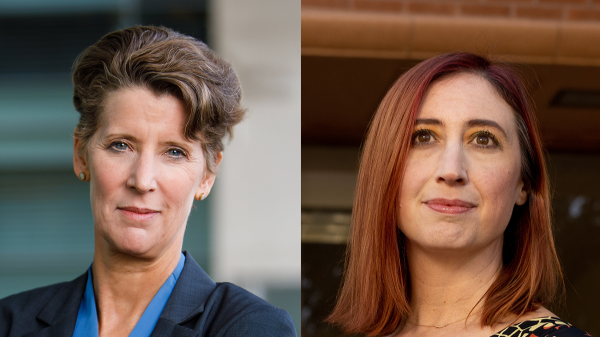President’s Honor Roll awarded to ASU in recognition of outstanding commitment to community

ASU was recently named to the 2015 President’s Higher Education Community Service Honor Roll in all four categories — Education, Economic Opportunity, General Community Service and Interfaith Community Service. ASU was one of the only large public universities to receive this award, the highest honor a college or university can receive for volunteering, service-learning and civic engagement.
This was ASU’s sixth year on the Honor Roll, and it was the first time the university was named one of four finalists for the Education Award, which recognizes institutions for their strong commitment to improving PreK-14 educational outcomes. In addition to the Finalist award, ASU was the only Arizona institution that was listed on the Honor Roll with Distinction for service that improves the quality of life for off-campus community residents, particularly low-income individuals and families.
The Honor Roll designation highlights how the university’s service-minded and civically engaged faculty and students have breathed life into the ASU Charter with their impactful efforts and commitment to the community. In 2015 alone, more than 15,000 students participated in academic service-learning or co-curricular community engagement, while an additional 22,107 students engaged in service and volunteer work in the community. As a result, students contributed nearly 1.9 million hours of service during that year.
“Our institutional passion for innovation is driven by our commitment to improve society,” said ASU President Michael Crow. “Creating a culture of social embeddedness is central to who we are and all we do in our pursuit of excellence, access and impact.”
The ASU Charter and design aspirations were first introduced more than a decade ago. Since then, ASU has twice been classified as a Community Engaged institution by the Carnegie Foundation, which further affirms the steps ASU has taken to prioritize social impact as an institutional obligation.
Now, students can engage through a number of ways, including community service, social entrepreneurship, University Service-Learning, or through their academic degree programs. For example, the College of Public Service and Community Solutions requires 100 percent of undergraduate students to complete a Solutions-Based Learning (SBL) credit requirement; SBL integrates community work into the classroom, ensuring students get hands-on learning community experience prior to graduation.
The Ira A. Fulton Schools of Engineering encourages their 20,000 engineering students with 60-plus Fulton student organizations to share their energy and passion for science, technology, engineering and math with more than 11,000 elementary and secondary students throughout Arizona by way of their 56 PreK-14 educational outreach programs.
ASU is also home to dozens of interdisciplinary centers and institutes that leverage the unique insights from diverse areas of scholarship to address social challenges, such as the award-winning Project Humanities, which engages students and faculty as leaders in local, national and international conversation about the value of a shared humanity and understanding across communities through service, programming and research.
All of these represent opportunities for students to deepen their understanding of complex social issues and embrace a higher level of civic and social responsibility throughout their academic career and beyond. Graduate student Ethan Clay, who studies the history of Arizona’s public institutions and volunteer teaches a not-for-credit history course in the Eyman State Prison through the Prison Education Programming Initiative at ASU, explained, “Having the opportunity to teach in the prison has helped me better understand the real, concrete problems facing our incarceration system. It also gave me perspective on what change is actually possible within the confines of the current system and how I can help improve it in some small way.”
“The scale of impact that ASU is able to accomplish with community partners is enormous. We look forward to finding new ways to collaborate with partners to continue producing more engaged graduates and further strengthen the communities we serve,” said Lindsey Beagley, director of social embeddedness in the ASU Office of University Initiatives. “We are very honored to receive such a high Honor Roll distinction and grateful for the many community partners that helped make it possible.”
To learn more about ASU’s commitment to connecting with communities, read the 2016 Social Embeddedness Report: Collaboration as a driving force and visit community.asu.edu to get plugged into the ASU Social Embeddedness ecosystem.
More University news

2 ASU faculty members elected to prestigious National Academy of Medicine
Two distinguished Arizona State University faculty members have been elected to the National Academy of Medicine.Sally C.…

ASU establishes Center for Free Speech, will host annual free speech forum
Arizona State University is establishing a new Center for Free Speech to encourage the uninhibited exchange of ideas, and the…

Public affairs professor, back at ASU after 3 years with NSF, is named Sackton Chair
After three years at the National Science Foundation, Professor Mary Feeney has returned to Arizona State University, where she…